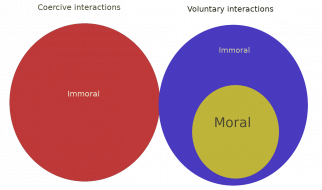Does Oedipus?s experience in the play tell the audience free will is an illusion and our lives are predetermined?
In Sophocles? Oedipus the King, the theme of fate versus free will appears often throughout the play. It is prophesied to Oedipus?s parents, Jocasta and Laius, that their son would grow up to kill his father and marry his mother. Diana McHugh addresses the concept of fate by writing,
Their attempt to assert their free will is foiled when fate intervenes, in the form of the ?good will? of a Shepherd who spares the infant?s life.
Jocasta and Laius attempt to get rid of their son but fate triumphs. Oedipus? fate throughout the play has been decided by the prophecy which contributes to his destruction. According to Alistar Cameron, Oedipus?s fate is not complete before the beginning of the play (134).
Apollo is aware Oedipus is guilty of killing his father so when Apollo asks for Laius?s killer to be found, Oedipus will find himself. Oedipus? pride is emphasized when he searches for Laius? killer to stop the plague; he wants to find the killer and protect himself. McHugh states,
?Oedipus relentlessly begins the long search to find the killer, ignorant to the fact that it is he himself and that his fate is closing upon him.?
Oedipus is ignorant to the fact that by searching for the killer he is sealing his own fate.
Through Oedipus? efforts to find the killer, he summons the blind prophet Tiresias to his palace for question. The scene between Tiresias and Oedipus is the first scene in the play to demonstrate strong conflict; audience members see Oedipus? temper for the first time. Before this scene, Oedipus has acted calmly but loses patience when Tiresias refuses to reveal the identity of the killer. Tiresias?s confidence in the prophecy while Oedipus?s free will falters:
Hear me out. Since you have thrown my blindness at me I will tell you what yours don?t see: what evil you are steeped in. You don?t see where you live or who shares your house. Do you know your parents? You are their enemy in this life and down there with the dead. (ll. 495?503)
Oedipus believes by search for Laius?s killer he is using his own free will but that is not the case. McHugh points out that Oedipus
compulsively continues his search for the murderer despite the warnings he receives. It is through his own questioning that he discovers that fate has had its way after all, and that he is the one guilty of the murder of Laius, and that his wife, Jocasta is in fact his mother.
Oedipus?s ignorance of the prophecy ultimately leads to his destruction. Oedipus leaves the house of his adoptive parents, Polybus and Merope, hoping to avoid the prophecy coming true. Oedipus uses his free will to take this action but doing so leads up to his prophecy coming true. Oedipus?s destiny is predetermined at birth by the gods. Having his life predetemined by fate leaves little space for free will to intervene to change that. Discovering he is the killer, Oedipus blinds himself and is exiled from Thebes.

